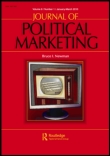 |
| Samantha Cameron in Hello magazine |
marketable qualities of the leaders themselves. Second, while mainstream media outlets—particularly newspapers—sought to cover all three women, they did so drawing upon established gender-based conventions, focussing on the wives' physical appearance and apparent dedication to their husbands. Third, while the wife of the Liberal Democrat leader opted for limited and strategic contact with media, the wives of the Conservative and Labour leaders exploited a range of new media platforms, combining official party websites, personal blogs, and webcasts. Angela and Michael argue that any assessment of the role of the spouses of party leaders has to look at media-driven priorities only alongside the various strategies open to parties and individuals in managing media activities. We also suggest that there is scope to use the coverage of leaders' spouses to explore the development, limits, and gender politics of any shift toward presidentialism.
Michael Higgins and Angela Smith (2013). “My Husband, My Hero”: Selling the Political Spouses in the 2010 General Election. Journal of Political Marketing. 12 (2-3): 197-210.

